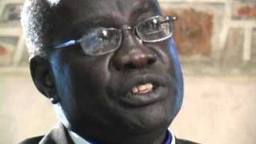You are here: Home | Featured | National News | News | Retired archbishop questions importance of the Igga committee

Retired Archbishop Daniel Deng Bul | Credit | File photo
The retired archbishop of the Episcopal Church of South Sudan has expressed doubt about the need for the latest greater Jonglei peace dialogue initiated, saying he successfully completed the same task recently.
Daniel Deng Bul says the government ignored the implementation of his committee’s recommendations he presented to the presidency in 2015.
Since the beginning of 2020, there have been reports of violent clashes in counties of Jonglei and the Pibor Administrative Area – involving armed youth from rival communities – over cattle, child abduction, and revenge killings.
In June, President Salva Kiir tasked Vice President Dr. James Wani Igga with resolving the ethnic conflict in the state and Pibor Administrative Area.
Also read: Igga kneels, urging Jonglei elders to persuade youth for peace
In May 2012, traditional leaders from six communities in Jonglei and Pibor administrative area signed an agreement in Bor town to end inter-tribal conflict in the state.
“It’s the same President who appointed me one time and we succeeded to bring the six tribes in Jonglei and they agreed and signed a declaration in the presence of our President,” said Retired Archbishop Daniel Deng Bul, who headed up the presidential Committee for Peace, Reconciliation and Tolerance, between 2012 and 2015.
Some of the resolutions that were to be implemented by traditional leaders include combating abductions; holding meetings among cattle camp youth; waiving compensation for those previously killed; tracing, identifying and returning abductees; discussing bride prices; and amnesty for stolen cattle.
The state and national government were asked to enforce law and order; set up effective buffer zones; recruit youths into organized forces; arrest and try culprits; protect civilians; enhance security force equipment; conduct aerial surveillance, share resources equitably; and create employment.
“There are already written agreements among the six tribes in Jonglei. As far as we are not following what we have done long time ago, then we are cycling each other,” he continued.
However, Archbishop Deng argued that Jonglei will only achieve peace if the previous community grievances are addressed.
“So, it is up to the Vice President to start again but, they should have been going to what has been already written down,” he added.
In May, the UN Human Rights Commission noted an increase in inter-communal violence with 658 people killed, 452 wounded, and 592 abducted in the first quarter of 2020.
Recent fighting in Akobo County and Jalle Payam of Jonglei, Gumuruk County of Pibor Administrative Area has resulted in the deaths and displacement of civilians.
Most of the remote areas in the Greater Jonglei have continued to experience communal and tribal violence.
Communal violence is a form of violence that is committed across ethnic or communal lines.
The violent parties feel solidarity for their respective groups, and victims are chosen based upon group membership.
Support Eye Radio, the first independent radio broadcaster of news, information & entertainment in South Sudan.
Make a monthly or a one off contribution.
Copyright 2024. All rights reserved. Eye Radio is a product of Eye Media Limited.